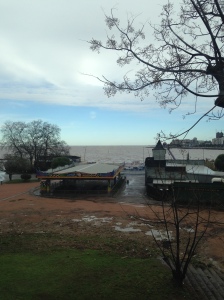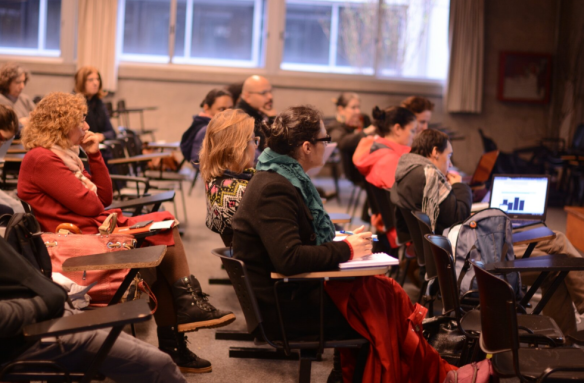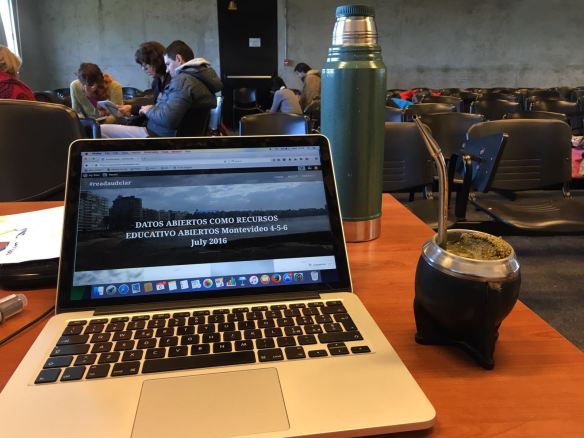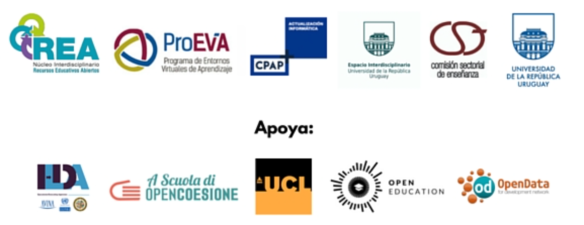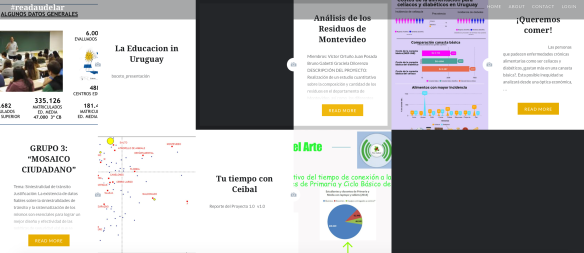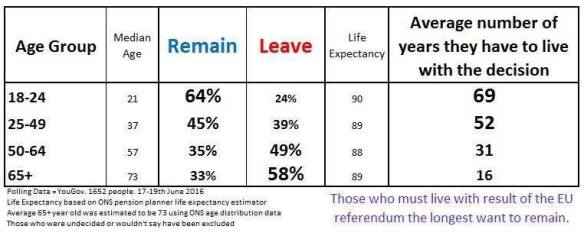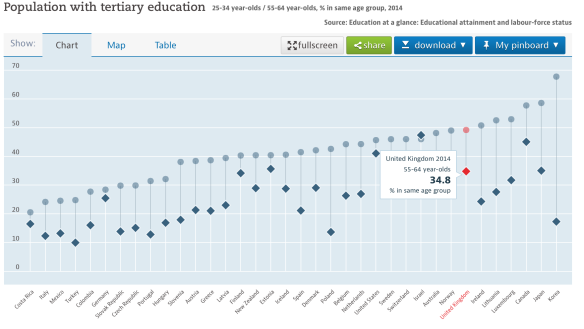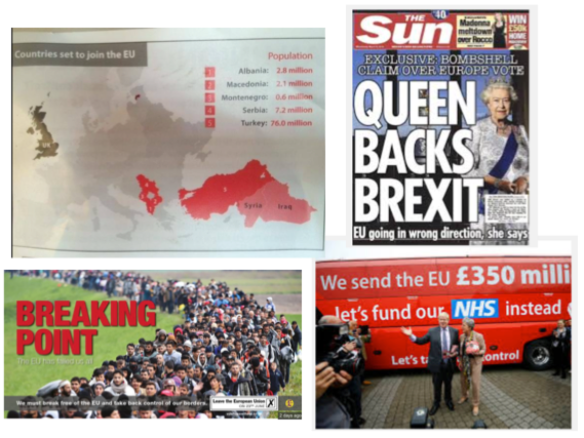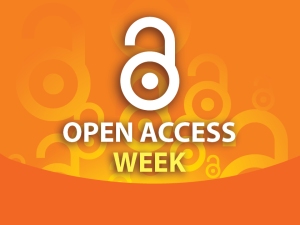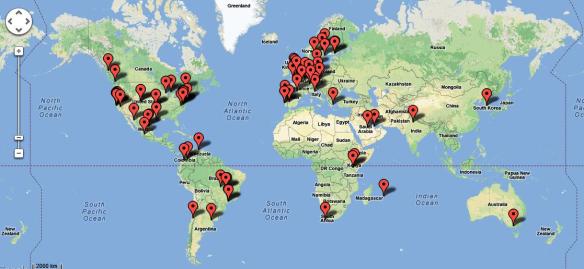*** As I got a very large list of references by @edaberta about OER research in Portuguese and by on the literature they collected for the Wikijis project I will continue this post in a part II and possibly in a part III.
**Updated on the 8th of October with part of the Portuguese literature in OER**
—
During the last 4 years and with a little help of my friends (mostly @leohavemann & @ernestopriego) I collected a large (very large) list of references on OER, Open Education, Open Educational Practices, repositories, open access and related themes which I used to write my PhD and all the papers / columns / presentations we have written, and, basically this lists has been stored in my ref management system for a while, quietly, but suddenly this week I been asked to share my list of references by few of my fellow OER researchers, so here it is… but before start, please read the notes below
- Please bear in mind this is my very personal OER bibliography, and I’m sure I’m forgetting to add some super important references and key resources, or that there are some mistakes in this post, so, if you are twisting your head around and crawling on the ceiling like Linda Blair because I forgot to add THAT piece of research or because the reference is not correct, please forgive me and send me the reference and/or the link to the paper.
- If you have written some research (papers, conferences papers, dissertations et al.) in open education, OER, open repositories of T&L resources et al., in any language and you would like to see the reference on this post, simply add the papers’ reference (APA – MLA) in the comments area, or send me a tweet with the link. Please send over only published – peer reviewed articles, as I cannot refer blog posts or other online materials, and make sure you add the link to retrieve the resource. I will give preference to the papers published in Open Access Journals as they are accessible to all…
- Also, there is a possibility (well, I’m sure) that some of the links are broken, sorry for that, the best way to retrieve a paper with a broken link is by going to Google Scholar – your local library system and search for it. I don’t think I will have the time to fix broken links because, as you might know, managing references is like having a leaking ceiling, you fix one hole and starts dripping somewhere else.
- Finally, if you find listed here a paper that speaks about OER, Open Access, OEP, and any other open concept but is chained to a paywall journal, first inhale and exhale a few times and the try contacting the author(s) of the article asking them why? (why, why, why?…) and maybe, ping the paper’s URL to the friends from the Open Access Button – @oa_button to raise awareness about the value of open access and also to highlight the open content / paywalled published contradiction…
So, the reference list is here, is not perfect I know but hope is useful…
Bibliography of OER – ROER – RLO related themes
Abegg, I., Bastos, F. da P. de , Alberti, T. F., & Mallmann, E. M. (2013). MOOC mediado por REA : prática da liberdade nos programas de capacitação continuada no ensino superior. Retrieved from https://repositorioaberto.uab.pt/handle/10400.2/3076
Abeywardena, I., Raviraja, S., & Tham, C. (2012). Conceptual framework for parametrically measuring the desirability of open educational resources using D-index. The International Review of Research in Open and Distance Learning, 5(3). Retrieved from http://www.irrodl.org/index.php/irrodl/article/view/1177
Abeywardena, I., Gajaraj , D. and Choo, K. L (2013) Open educational resources in Malaysia. In: Open educational resources: an Asian perspective. Commonwealth of Learning, Vancouver, Canada, pp. 119-132. ISBN 9781894975612. Retrieved from http://eprint.wou.edu.my/50/
Abeywardena, I., Tham, C., & Raviraja, S. (2012). Conceptual Framework for Parametrically Measuring the Desirability of Open Educational Resources using D-Index. Journal of Research in Open and Distance Learning, 13(2). Retrieved from http://www.irrodl.org/index.php/irrodl/article/view/1177/2181
Aguaded-Gómez, J. I. (2013). The MOOC Revolution: A new form of education from the technological paradigm? Comunicar, 21(41), 07–08. doi:10.3916/C41-2013-a1
Albert, M.-T. (2012). Community development through World Heritage. World Heritage Papers 31 – Community Development through World Heritage, 31, 32 – 38. Retrieved from http://whc.unesco.org/documents/publi_wh_papers_31_en.pdf
Alevizou, P. (2012a). Open to interpretation? : productive frameworks for understanding audience engagement with OER. In Cambridge 2012: Innovation and Impact – Openly Collaborating to Enhance Education, a joint meeting of OER12 and OpenCourseWare Consortium Global 2012. Cambridge. Retrieved from http://oro.open.ac.uk/33452/
Alencar, A., & Neto, J. M. (2012). Democratizando o Acesso à Vida e Obra de Paulo Freire: a experiência do Projeto Paulo Freire Memória e Presença. Anais dos Workshops do Congresso Brasileiro de Informática na Educação, 1(1). Retrieved from http://br-ie.org/pub/index.php/wcbie/article/view/1886
Almeida, L. B. de, Merkle, L. E., & Silva, E. A. (2012). Proposta de Fluxo de Trabalho para Organização de Repositórios Abertos de Maneira Colaborativa. Anais dos Workshops do Congresso Brasileiro de Informática na Educação, 1(1). Retrieved from http://br-ie.org/pub/index.php/wcbie/article/view/1885
Alevizou, P. (2012b). The dark side of the knowledge commons?: open educational media and tensions surrounding autonomy and novel spheres of control. In ECREA 2012 Pre-Conference: Imposing Freedoms: The Role of Copyright, Privacy and Censorship Governance in the Re/definition of Rights in Digital Media. Istanbul. Retrieved from http://oro.open.ac.uk/35483/
Almeida, Fernando José de , Silva, M. da G. M. da , & Franco, M. M. G. (2012). Materiais mediadores e abertos para construção de conhecimento. Retrieved from http://www.curriculosemfronteiras.org/vol12iss3articles/almeida-silva-franco.pdf
Amiel, T. (2013). Identifying Barriers to the Remix of Translated Open Educational Resources. The International Review of Research in Open and Distance Learning, 14(1). Retrieved from http://www.irrodl.org/index.php/irrodl/article/view/1351/2448
Amiel, T., Orey, M., & West, R. (2011). Recursos educacionais abertos (rea): modelos para localização e adaptação. ETD–Educaçao Temática Digital, 112–125. Retrieved from http://www.fe.unicamp.br/revistas/ged/etd/article/view/2284
Amiel, T. (2014). Recursos Educacionais Abertos: uma análise a partir do livro didático de história. Retrieved from http://rhhj.anpuh.org/ojs/index.php/RHHJ/article/view/117/93
Amiel, T., & Santos, K. (2013). Uma análise dos termos de uso de repositórios de recursos educacionais digitais no Brasil. Trilha Digital, 1(1), 118–133. Retrieved from http://editorarevistas.mackenzie.br/index.php/TDig/article/view/5892
Andrade, A., Ehlers, U.-D., Caine, A., Carneiro, R., & Conole, G. (2011). Beyond OER: Shifting Focus from Resources to Practices (pp. 1–191). Duisburg-Essen. Retrieved from http://www.oerasia.org/OERResources/8.pdf
Annand, D. (2007). Re-organizing Universities for the Information Age. International Review of Research in Open and Distance Learning, 8(3). Retrieved from http://www.irrodl.org/index.php/irrodl/article/view/372/952
Arcos, B. de los. (2014). Flipping with OER : K12 teachers ’ views of the impact of open practices on students. In OCWC Global 2014: Open Education for a Multicultural World. Ljubljana,. Retrieved from http://oro.open.ac.uk/40093/
Arimoto, M. M., & Barbosa, E. F. (2012). Um conjunto preliminar de práticas para o desenvolvimento ágil de recursos educacionais abertos. Anais dos Workshops do Congresso Brasileiro de Informática na Educação, 1(1). Retrieved from http://www.br-ie.org/pub/index.php/wcbie/article/view/1888
Armellini, A., & Nie, M. (2013). Open educational practices for curriculum enhancement. Open Learning: The Journal of Open, Distance and E-Learning, 28(1), 7–20. doi:10.1080/02680513.2013.796286
Atenas, J., & Havemann, L. (2013). A vision of Quality in Repositories of Open Educational Resources. In Y. Punie, Christine Redecker, & J. Castaño (Eds.), OPEN EDUCATION 2030. JRC-IPTS CALL FOR VISION PAPERS. PART III: HIGHER EDUCATION (pp. 54–59). European Commission Joint Research Centre Institute for Prospective Technological Studies. Retrieved from http://is.jrc.ec.europa.eu/pages/EAP/documents/All_OE2030_HE_v 4_author revised_OK.pdf
Atenas, J., & Havemann, L. (2013). Quality assurance in the open: an evaluation of OER repositories. INNOQUAL-International Journal for Innovation and Quality in Learning, 1(2), 22–34. Retrieved from http://papers.efquel.org/index.php/innoqual/article/view/30/12
Atenas, J., & Havemann, L. (2014). Questions of quality in repositories of open educational resources: a literature review. Research in Learning Technology, 22. doi:http://dx.doi.org/10.3402/rlt.v22.20889
Atenas, J., Havemann, L., & Priego, E. (2014). Opening teaching landscapes: The importance of quality assurance in the delivery of open educational resources. Open Praxis, 6(1), 29–43. doi:http://dx.doi.org/10.5944/openpraxis.6.1.81
Atenas, J., Rojas-Sateler, F., & Pérez-Montoro, M. (2012). Repositorios de recursos educativos abiertos. El Profesional de La Información, 21(2), 190–193. doi:10.3145/epi.2012.mar.10
Atkins, D. E., Brown, J. S., & Hammond, A. L. (2007). A review of the open educational resources (OER) movement: Achievements, challenges, and new opportunities. The William and Flora Hewlett Foundation. Retrieved from http://www.hewlett.org/uploads/files/ReviewoftheOERMovement.pdf
Attis, D., Koproske, C., & Miller, C. (2012). Understanding the MOOC Trend The Adoption and Impact of Massive Open Online Courses. Retrieved from https://www20.csueastbay.edu/oaa/files/Info_files/MOOC Trend.pdf
Barin, C. S., Müller, L., & Ellensohn, R. M. (2012). Construção de significados e interação com, no e pelo computador: Estudos problematizados no AVEA Moodle sobre uso das tecnologias da informação e comunicação. RENOTE, 10(1). Retrieved from http://seer.ufrgs.br/renote/article/view/30881
Barbosa, E., Gimenes, I. M., & Barroca, L. (2012). Towards the development of open educational resources: challenges and issues. In II International Symposium on OER: Issues for globalization and localization. Rio de Janeiro. Retrieved from http://www.br-ie.org/pub/index.php/wcbie/article/view/1889
Barker, P. (2005). What is IEEE Learning Object Metadata/IMS Learning Resource Metadata? Cetis standards briefings series. Bolton. Retrieved from http://publications.cetis.ac.uk/wp-content/uploads/2011/02/WhatIsIEEELOM.pdf
Barker, P. (2010). Metadata for Learning Materials: An Overview of Existing Standards and Current Developments. Technology, Instruction, Cognition and Learning, 7(3 – 4), 225 –243. Retrieved from http://www.oldcitypublishing.com/TICL/TICLcontents/TICLv7n3-4contents.html
Barrio, M., & García, S. (2007). Acciones de diseño y desarrollo de objetos educativos digitales: programas institucionales. RUSC. Universities and Knowledge Society Journal, 14(Special Issue: Contenidos educativos en abierto). Retrieved from http://www.uoc.edu/rusc/4/1/dt/esp/gertrudix_alvarez_galisteo_galvez.pdf
Bassani, P. B. S., & Barbosa, D. N. F. (2012). Uma experiência envolvendo o desenvolvimento de recursos educacionais digitais sob a perspectiva da atividade.RENOTE, 10(3). Retrieved from http://seer.ufrgs.br/renote/article/view/36399
Beetham, H. (2011). Understanding the role of OERs in open educational practices. Retrieved from http://www.slideshare.net/loumcgill/understanding-the-role-of-oers-in-open-educational-practices
Bell, F. (2011). Connectivism: Its Place in Theory-Informed Research and Innovation in Technology- Enabled Learning. International Review of Research in Open and Distance Learning, 12(3), 98 – 118. Retrieved from http://www.irrodl.org/index.php/irrodl/article/view/902/1664
Benkler, Y. (2005). Common wisdom: Peer production of educational materials. Retrieved from http://benkler.xablsng.com/Common_Wisdom.pdf
Bennett, S., & Oliver, M. (2011). Talking back to theory: the missed opportunities in learning technology research. Research in Learning Technology, 19(3), 179–189. doi:10.1080/21567069.2011.624997
Bergamin, P., & Filk, C. (2009). «Open Educational Resources » ( OER ) – Ein didaktischer Kulturwechsel ? In M. Müller, P. Bergamin, & C. Filk (Eds.), Offene Bildungsinhalte (OER), Teilen von Wissen oder Gratisbildungskultur? (pp. 25 – 38). Bern: Hep verlag. Retrieved from http://www.ifel.ch/en/publikationen-en/OER-Bergamin_Filk.pdf
Bindé, J., & Matsuura, K. (2005). Towards knowledge societies. Paris: United Nations Educational, Scientific and Cultural Organization. Retrieved from http://unesdoc.unesco.org/images/0014/001418/141843e.pdf
Bissell, A. (2009). Permission granted: open licensing for educational resources. Open Learning: The Journal of Open and Distance Learning, 24(1), 97–106. doi:10.1080/02680510802627886
Boneu, J. (2007). Plataformas abiertas de e-learning para el soporte de contenidos educativos abiertos. RUSC. Universities and Knowledge Society Journal, 4. Retrieved from http://www.uoc.edu/ojs/index.php/rusc/article/viewFile/v4n1-contenidos-educativos-en-abierto/v4n1-contenidos-educativos-en-abierto#page=36
Bossu, C., Bull, D., & Brown, M. (2012). Opening up Down Under: the role of open educational resources in promoting social inclusion in Australia. Distance Education, (August 2012), 37–41. Retrieved from http://www.tandfonline.com/doi/abs/10.1080/01587919.2012.692050
Brace, I. (2008). Questionnaire Design: How to Plan, Structure and Write Survey Material for Effective Market Research (2nd ed., p. 288). Philadelphia: Kogan – Market Research in Practice.
Brent, I., Gibbs, G. R., & Gruszczynska, A. K. (2012). Obstacles to creating and finding Open Educational Resources: the case of research methods in the social sciences. Journal of Interactive Media in Education, (Special Issue on Open Educational Resources), 1–17. Retrieved from http://www-jime.open.ac.uk/jime/article/viewArticle/2012-05/html
Browne, T., Holding, R., Hollell, A., & Rodway-Dyer, S. (2010). The challenges of OER to Academic Practice. Journal of Interactive Media in Education, (Special Issue on Open Educational Resources), 1–15. Retrieved from http://www-jime.open.ac.uk/jime/article/viewArticle/2010-3/html
Buckler, A., Perryman, L., Seal, T., & Musafir, S. (2014). The role of OER localisation in building a knowledge partnership for development: Comparing the TESSA and TESS-India teacher education projects. Open Praxis. Retrieved from https://www.openpraxis.org/index.php/OpenPraxis/article/view/136
Butcher, N. (2010). OER dossier: Open educational resources and higher education. In Workshop for Heads of Commonwealth Universities. South Africa. Retrieved from http://www.col.org/SiteCollectionDocuments/OER_Open_Educational_Resources_and_Higher_Education.pdf
Butcher, N., Kanwar, A., & Uvalić-Trumbić, S. (Eds.). (2011). A Basic Guide to Open Educational Resources (OER) (p. 133). Paris & Vancouver: Commonwealth of Learning & UNESCO. Retrieved from http://dspace.col.org/handle/123456789/428
Camilleri, A., Ehlers, U., & Pawlowski, J. (2014). State of the Art Review of Quality Issues related to Open Educational Resources ( OER ) (p. 57). Retrieved from http://www.pedocs.de/volltexte/2014/9101/
Campbell, L. M., Barker, P., Currier, S., & Syrotiuk, N. (2013). The Learning Registry : social networking for open educational resources? In OER13: Creating a Virtuous Circle (pp. 1–6). Nottingham. Retrieved from http://www.medev.ac.uk/oer13/108/view/
Carson, S. (2005). 2004 MIT OCW Program Evaluation Findings Report. Massachusets Institute of Technology. Retrieved from http://ocw.mit.edu/OcwWeb/Global/AboutOCW/evaluation.htm
Castells, M., & Cardoso, G. (Eds.). (2005). The Network Society: From Knowledge to Policy. The Network Society From Knowledge to Policy. Washington: Center for Transatlantic Relations The Paul H. Nitze School of Advanced International Studies The Johns Hopkins University. Retrieved from http://works.bepress.com/cgi/viewcontent.cgi?article=1098&context=jane_fountain#page=29
Castro, J. B. de, Souza, M. de F. C. de, Luiz, A. G., & Filho, J. A. de C. (2012). Localização de Recursos Educacionais Digitais Americanos para o Ensino de Matemática no Contexto Brasileiro. Anais dos Workshops do Congresso Brasileiro de Informática na Educação, 1(1). Retrieved from http://br-ie.org/pub/index.php/wcbie/article/view/1891
Caswell, T., Henson, S., Jensen, M., & Wiley, D. (2008). Open Educational Resources: Enabling universal education. International Review of Research in Open and Distance Learning, 9(1), 1–11. Retrieved from http://www.irrodl.org/index.php/irrodl/article/view/469/1001
Chan, L. (2004). Supporting and enhancing scholarship in the digital age: the role of open access institutional repository. Canadian Journal of Communication, 29, 277–300. Retrieved from http://cjc-online.ca/index.php/journal/article/viewArticle/1455
Christen, K. (2011). Opening Archives: Respectful Repatriation. American Archivist, 4, 185–210. Retrieved from http://archivists.metapress.com/index/4233NV6NV6428521.pdf
Clements, K. I., & Pawlowski, J. M. (2012). User-oriented quality for OER: understanding teachers’ views on re-use, quality, and trust. Journal of Computer Assisted Learning, 28(1), 4–14. doi:10.1111/j.1365-2729.2011.00450.x
Clements, K., Pawlowski, J., & Manouselis, N. (2014). Why Open Educational Resources Repositories fail – Review of Quality Assurance Approaches. In EDULEARN14 Proceedings. 6th International Conference on Education and New Learning Technologies Barcelona, Spain (pp. 929–939). Barcelona: International Association of Technology, Education and Development IATED. Retrieved from http://library.iated.org/view/CLEMENTS2014WHY
Cleveland-Innes, M. (2012). Editorial: Who needs leadership? Social problems, change, and education futures. The International Review of Research in Open and Distance Learning, 13(2), 232 – 235. Retrieved from http://www.irrodl.org/index.php/irrodl/article/view/1226/2174
Coelho, D., Balula, A., & Ramos, F. (2014). O uso de recursos educacionais abertos no ensino superior: potencialidade, desafio e oportunidade. Retrieved from http://revistas.ua.pt/index.php/ID/article/view/2688/2544
Conole, G. (2012). Fostering social inclusion through open educational resources (OER). Distance Education, (August), 37–41. Retrieved from http://www.tandfonline.com/doi/full/10.1080/01587919.2012.700563
Cordón-García, J. (2007). The Citizens’ Europe: the challenges of gaining access to and preserving culture. In Declaration by the members of the European Academy of Yuste on the perspectives for a citizens’ and social europe (pp. 1–11). Yuste. Retrieved from http://eprints.rclis.org/handle/10760/8904
Corrado, E. (2005). The importance of open access, open source, and open standards for libraries. Issues in Science and Technology Librarianship, 5, 1–7. Retrieved from http://codabox.org/15/
Coughlan, T., Ebrahimi, N., McAndrew, P., & Pitt, R. (2013). Assessing OER impact across varied organisations and learners : experiences from the ” Bridge to Success ” initiative. In OER13: Creating a Virtuous Circle. Nottingham. Retrieved from http://oro.open.ac.uk/37754/
Coughlan, T., Pitt, R., & McAndrew, P. (2013). Building open bridges. Proceedings of the SIGCHI Conference on Human Factors in Computing Systems – CHI ’13, 991. doi:10.1145/2470654.2466127
Currier, S., Barton, J., O’Beirne, R., & Ryan, B. (2004). Quality assurance for digital learning object repositories: issues for the metadata creation process. Research in Learning Technology, 12(1), 5–20. doi:10.1080/0968776042000211494
D’Antoni, S. (2007). Open Educational Resources and Open Content for Higher Education. RUSC. Universities and Knowledge Society Journal, 4(1). Retrieved from http://www.uoc.edu/rusc/4/1/dt/eng/dantoni.pdf
D’Antoni, S. (2008). Open Educational Resources the way forward, deliberations of an international community of interest. Retrieved from Antoni_OERTheWayForward_2008_eng.pdf
D’Antoni, S. (2009). Open Educational Resources: reviewing initiatives and issues. Open Learning: The Journal of Open and Distance Learning, 24(1), 3–10. doi:10.1080/02680510802625443
Das, A. K. (2008). Open Access to Knowledge and Information: Scholarly Literature and Digital Library Initiatives The South Asian Scenario. (B. K. S. and J. Josiah, Ed.) (p. 137). New Delhi: UNESCO. Retrieved from http://arizona.openrepository.com/arizona/handle/10150/106335
Davis, H. C., Carr, L., Hey, J. M. N., Howard, Y., Millard, D., Morris, D., & White, S. (2010). Bootstrapping a Culture of Sharing to Facilitate Open Educational Resources. IEEE Transactions on Learning Technologies, 3(2), 96–109. doi:10.1109/TLT.2009.34
Descombe, M. (2010). The Good Research Guide for Small Scale Social Research Projects. (4th ed., p. 349). Maidenhead: McGraw – Hill Education.
DeVries, I. (2013). Evaluating Open Educational Resources: Lessons Learned. Procedia – Social and Behavioral Sciences, 83(2007), 56–60. doi:10.1016/j.sbspro.2013.06.012
Dezuanni, M., & Monroy-Hernandez, A. (2012). «Prosuming» across Cultures: Youth Creating and Discussing Digital Media across Borders. Comunicar, 19(38), 59–66. doi:10.3916/C38-2012-02-06
Dirckinck-Holmfeld, L., Hodgson, V., & McConnell, D. (Eds.). (2012). Exploring the Theory, Pedagogy and Practice of Networked Learning. New York, NY: Springer New York. doi:10.1007/978-1-4614-0496-5
Downes, S. (2001). Learning Objects: Resources For Distance Education Worldwide. International Review of Research in Open and Distance Learning, 2(1), 1–35. Retrieved from http://www.irrodl.org/index.php/irrodl/article/viewArticle/32
Downes, S. (2007). Models for sustainable open educational resources. Interdisciplinary Journal of Knowledge and Learning Objects, 3, 29–44. Retrieved from http://www.downes.ca/post/33401
Dueñas, L. (2008). Repositorios documentales y la iniciativa de archivos abiertos en Latinoamérica. BiD: Textos Universitaris de Biblioteconomia I Documentació, 20. Retrieved from http://bid.ub.edu/pdf/20gomez2.pdf
Edwards, R., Tracy, F., & Jordan, K. (2011). Mobilities, moorings and boundary marking in developing semantic technologies in educational practices. Research in Learning Technology, 19(3), 219–232. doi:10.1080/21567069.2011.624167
Ehiyazaryan, E. (2012). Embedding Open Educational Resources in Research Methods Teaching in Education, Social Science and Criminology. Retrieved from https://www.oerknowledgecloud.org/sites/oerknowledgecloud.org/files/Ester Ehiyazaryan Fellowship Final Report – Web Version.pdf
Ehlers, U., & Conole, G. (2010). Open Educational Practices : Unleashing the power of OER (pp. 1–9). Retrieved from http://efquel.org/wp-content/uploads/2012/03/OEP_Unleashing-the-power-of-OER.pdf
Farrow, R. (2014). OER Impact: Collaboration, Evidence, Synthesis. In CWC Global 2014: Open Education for a Multicultural World. Retrieved from http://cdlh7.free.fr/OCWC_2014/Final_papers/Paper_51.pdf
Ferguson, R., & Shum, S. B. (2012). Towards a social learning space for open educational resources. In A. Okada, T. Connolly, & P. Scott (Eds.), Collaborative Learning 2.0: Open Educational Resources (pp. 309–327). Hershey,: PA: IGI Global. doi:10.4018/978-1-4666-0300-4.ch017
Ferreira, G. M. dos S. (2012). De conteúdo a recurso, prática e pedagogia: sobre o movimento REA e suas ramificações. Revista Educação e Cultura Contemporânea, 9(18), 20–37. Retrieved from http://periodicos.estacio.br/index.php/reeduc/article/view/432
Fitzgerald, B. (2007). Open Content Licencing (OCL) for Open Educational Resources: Paper commissioned by the OECD’s Centre for Educational Research and Innovation (CERI) for the project on Open Educational Resources. Retrieved from http://learn.creativecommons.org/wp-content/uploads/2008/07/oecd-open-licensing-review.pdf
Friesen, N. (2009). Open Educational Resources: New Possibilities for Change and Sustainability. International Review of Research in Open and Distance Learning Review, 10(5), 1–13. Retrieved from http://www.irrodl.org/index.php/irrodl/article/view/664/1388
Friesen, N., & Wihak, C. (2013). From OER to PLAR: Credentialing for open education. Open Praxis, 5(1), 49–58. Retrieved from http://openpraxis.org/index.php/OpenPraxis/article/view/22
Geser, G. (2007). Prácticas y recursos de educación abierta: la hoja de ruta OLCOS 2012. RUSC. Universities and Knowledge Society Journal, 14(Special Issue: Contenidos educativos en abierto). Retrieved from http://www.uoc.edu/rusc/4/1/dt/esp/geser.pdf
Gonsales, P. (2012). Aberturas e rupturas na formação de professores. In Recursos Educacionais Abertos: práticas colaborativas e políticas públicas (Vol. 1, pp. 143–152). São Paulo – SP; Salvador- BA. Retrieved from http://livrorea.net.br/livroREA-1edicao-mai2012.pdf
Gohn, D. M. (2012, September 3). Educação musical à distância: Propostas para ensino e aprendizagem de percussão (Tese de Doutorado). Retrieved fromhttp://www.teses.usp.br/teses/disponiveis/27/27154/tde-13042010-225230/pt-br.php
Gosciola, V., & Versuti, A. (2012). Narrativa transmídia e sua potencialidade na educação aberta. In A. Okada (Ed.), Recursos educacionais abertos e redes sociais: Co-aprendizagem e desenvolvimento profissional. Londres: CoLearn/Open University. Retrieved from http://oer.kmi.open.ac.uk/?page_id=428ID-8
Gourley, B., & Lane, A. (2009). Re-invigorating openness at The Open University: the role of Open Educational Resources. Open Learning: The Journal of Open and Distance Learning, 24(1), 57–65. doi:10.1080/02680510802627845
Graham, G., & Campbell, L. (2003). UK Learning Object Metadata Core Draft. Retrieved from http://www.cetis.ac.uk/profiles/uklomcore
Greaves, L., Roller, S., & Bradley, C. (2010). Repurposing with a purpose: A story with a happy ending. Journal of Interactive Media in Education, 5. Retrieved from http://jime.open.ac.uk/2010/05
Haggard, S. (2013). The Maturing of the MOOC. Retrieved from https://www.gov.uk/government/publications/massive-open-online-courses-and-online-distance-learning-review
Harley, D., Henke, J., Lawrence, S., Miller, I., Perciali, I. and Nasatir, D. (2006). Use and Users of Digital Resources: A Focus on Undergraduate Education in the Humanities and Social Sciences. Berkeley: Center for Studies in Higher Education – UC Berkeley. Retrieved from http://cshe.berkeley.edu/research/digitalresourcestudy/report/digitalresourcestudy_final_report _text.pdf
Havemann, L., & Atenas, J. (2014). MOOCs must move beyond open enrolment and demonstrate a true commitment to reuse and long-term redistribution. LSE Impact of Social Sciences Blog. Retrieved from http://blogs.lse.ac.uk/impactofsocialsciences/2014/03/07/is-it-time-for-moocs-to-open-up/
Hepplestone, S., Holden, G., Irwin, B., Parkin, H. J., & Thorpe, L. (2011). Using technology to encourage student engagement with feedback: a literature review. Research in Learning Technology, 19(2), 117–127. doi:10.1080/21567069.2011.586677
Hockings, C., Brett, P., & Terentjevs, M. (2012). Making a difference—inclusive learning and teaching in higher education through open educational resources. Distance Education, (August), 37–41. Retrieved from http://www.tandfonline.com/doi/abs/10.1080/01587919.2012.692066
Holden, C. (2003). From Local Challenges to a Global Community : Learning Repositories and the Global Learning Repositories Summit (pp. 0–30). Retrieved from http://www.academiccolab.org/resources/FinalSummitReport.pdf
Howard Hughes Medical Institute. (2003). Bethesda Statement on Open Access Publishing. Maryland. Retrieved from http://legacy.earlham.edu/~peters/fos/bethesda.htm
Howard, S., & Maton, K. (2011). Theorising knowledge practices: a missing piece of the educational technology puzzle. Research in Learning Technology, 19(3), 191–206. doi:10.1080/21567069.2011.624170
Hylén, J. (2006). Open educational resources: Opportunities and challenges. Proceedings of Open Education. Retrieved from http://library.oum.edu.my/oumlib/sites/default/files/file_attachments/odl-resources/386010/oer-opportunities.pdf
Jacobi, R., & Woert, N. van der. (2012). Trend Report on Open Educational Resources 2012 – Surf Report (p. 81). Utrecht. Retrieved from http://www.surf.nl/en/knowledge-and-innovation/knowledge-base/2012/trend-report-on-open-educational-resources-2012.html
Johnstone, S. (2005). Open educational resources serve the world. Educause Quarterly, (3), 15–18. Retrieved from https://www.educause.edu/ir/library/pdf/eqm0533.pdf
Kawachi, P. (2009). Open Educational Resources: Other Frameworks. Open-Ed.net, 1–5. Retrieved from http://www.open-ed.net/oer-quality/others.pdf
Kawachi, P. (2013). Quality Assurance Guidelines for Open Educational Resources: TIPS Framework (p. 32). New Dehli: Commonwealth Educational Media Centre for Asia New Delhi. Retrieved from http://cemca.org.in/ckfinder/userfiles/files/OERQ_TIPS_978-81-88770-07-6.pdf
König, A. (2009). Unvorhergesehene Nutzung von neuen Lehr-Lern-Medien. In Offene Bildungsinhalte (OER) Teilen von Wissen oder Gratisbildungskultur? (pp. 73–99). Göttingen: hep verlag ag, Bern. Retrieved from http://pd.zhaw.ch/hop/1528233917.pdf
Koohang, A., & Harman, K. (2007). Advancing Sustainability of Open Educational Resources. Issues in Informing Science and Information Technology, 4. Retrieved from http://proceedings.informingscience.org/InSITE2007/IISITv4p535-544Kooh275.pdf
Koppi, T., Bogle, L., & Bogle, M. (2005). Learning objects, repositories, sharing and reusability. Open Learning: The Journal of Open and Distance Learning, 20(1), 83–91. doi:10.1080/0268051042000322113
Kuhlen, R., & Seadle, M. (2011). Zur urheberrechtlichen Gestaltung von Repositorien Handreichung für Universitäten, Forschungszentren und andere Bildungseinrichtungen. (R. Kuhlen, M. Seadle, T. Hartmann, E. Di Rosa, & V. Djordjevic, Eds.)Handreichung für Universitäten, Forschungszentren …. Berlin: Institut für Bibliotheks- und Informationswissenschaft Humboldt-Universität zu Berlin. Retrieved from http://www.iuwis.de/sites/default/files/IUWIS Zur urheberrechtlichen Gestaltung von Repositorien.pdf
Laaser, W., Rodrigues, R. S., & Fachin, G. R. B. (2012). Educação a distância e Recursos Abertos. Retrieved from http://www.rieoei.org/deloslectores/2879.pdf
Lane, A. (2009). The Impact of Openness on Bridging Educational Digital Divides. International Review of Research in Open and Distance Learning, 10(5). Retrieved from http://www.irrodl.org/index.php/irrodl/article/view/637
Lane, A., & McAndrew, P. (2010). Are open educational resources systematic or systemic change agents for teaching practice? British Journal of Educational Technology, 41(6), 952–962. doi:10.1111/j.1467-8535.2010.01119.x
Langen, F. de. (2013). Strategies for Sustainable Business Models for Open Educational Resources. International Review of Research in Open and Distance Learning, 14(2), 53–66. Retrieved from http://www.irrodl.org/index.php/irrodl/article/view/1533/2485
Law, P., Perryman, L., & Law, A. (2013). Open educational resources for all ? Comparing user motivations and characteristics across The Open University ’s iTunes U channel and OpenLearn platform. In Open and Flexible Higher Education Conference 2013. Paris. Retrieved from http://oro.open.ac.uk/39102/
Leacock, T., & Nesbit, J. (2007). A framework for evaluating the quality of multimedia learning resources. Educational Technology & Society, 10(2). Retrieved from http://www.ifets.info
Leite, D. M., & Latanza, J. A. (2014). Repensando a práxis educacional: breve olhar sobre os recursos educacionais abertos . Retrieved from http://rhhj.anpuh.org/ojs/index.php/RHHJ/article/view/124/98
Liyanagunawardena, T., Adams, A., & Williams, S. (2013). MOOCs: A Systematic Study of the Published Literature 2008-2012. International Review of Research in Open and Distance Learning, 14(3), 202–227. Retrieved from http://www.irrodl.org/index.php/irrodl/article/view/1455/2531
Mallmann, Elena Maria, Jacques, Juliana Sales, Sonego, Anna Helena Silveira, Teixeira, Tatiana Gloor, Toebe, Iris Cristina Datsch, & Domingues, Fabiane da Rosa. (2013). Potencial dos Recursos Educacionais Abertos para integração das tecnologias e convergência entre as modalidades na UFSM. Retrieved from http://www.reveduc.ufscar.br/index.php/reveduc/article/viewFile/742/274
Marcus-Quinn, A., & Diggins, Y. (2013). Open Educational Resources. Procedia – Social and Behavioral Sciences, 93, 243–246. doi:10.1016/j.sbspro.2013.09.183
Martin, F. G. (2012). Will massive open online courses change how we teach?. Communications of the ACM, 55(8), 26 – 28. Retrieved from http://dl.acm.org/citation.cfm?id=2240246
Mcandrew, B. P., Scanlon, E., & Clow, D. (2010). An Open Future for Higher Education Journal. Educause Quarterly, 33(1). Retrieved from http://www.educause.edu/ero/article/open-future-higher-education
McAndrew, P. (2010). Defining openness: updating the concept of “open” for a connected world. Journal of Interactive Media in Education, 10, 1–13. Retrieved from http://jime.open.ac.uk/jime/article/viewArticle/2010-10/html
McAndrew, P., & Farrow, R. (2013). Open education research: from the practical to the theoretical. In S. eds. McGreal, Rory; Kinuthia, Wanjira and Marshall (Ed.), Open Educational Resources: Innovation, Research and Practice (pp. 66–78). Vancouver: Commonwealth of Learning and Athabasca University,. Retrieved from http://oro.open.ac.uk/37756/
McAndrew, P., & Farrow, R. (2013). The ecology of sharing : synthesizing OER research. In OER 13: Creating a virtuous circle. Nottingham. Retrieved from http://oro.open.ac.uk/37755/
Mcandrew, P., Farrow, R., Law, P., & Elliot-cirigottis, G. (2012). Learning the Lessons of Openness. Journal of Interactive Media in Education, 1–13. Retrieved from http://www-jime.open.ac.uk/article/2012-10/pdf
McCormick, R. (2004). Issues of learning and knowledge in technology education. International Journal of Technology and Design Education, 14(1), 21–44. doi:dx.doi.org/doi/10.1023/B:ITDE.0000007359. 81781.7c
McGreal, R. (2011). Open educational resource repositories: An analysis. In The 3rd Annual Forum on e-Learning Excellence, Dubai, UAe. Dubai. Retrieved from http://elexforum.hbmeu.ac.ae/Proceeding/PDF/Open Educational Resource.pdf
Mcgreal, R., Kinuthia, W., & Marshall, S. (Eds.). (2013). Open Educational Resources : Innovation, Research and Practice. Atahbasca: UNESCO, Commonwealth of Learning and Athabasca University. Retrieved from http://www.col.org/resources/publications/Pages/detail.aspx?PID=446
McLean, N., & Lynch, C. (2003). Interoperability between information and learning environments: bridging the gaps: a joint white paper on behalf of the IMS Global Learning Consortium and the Coalition for Networked Information. Retrieved from http://www.imsglobal.org/TAI3/McLean.pdf
Mesquita, O. A. de, & Filho, J. A. de C. (2012). A construção de conteúdos Educacionais Digitais 2.0 sob enfoque da múltipla autoria. Anais dos Workshops do Congresso Brasileiro de Informática na Educação, 1(1). Retrieved from http://br-ie.org/pub/index.php/wcbie/article/view/1890
Milligan, C. (2013). Patterns of Engagement in Connectivist MOOCs. MERLOT Journal of Online Learning and Teaching, 9(2), 149–159. Retrieved from http://jolt.merlot.org/vol9no2/milligan_0613.htm
Misra, P. K. (2013). Pedagogical quality enrichment in OER based courseware: Guiding principles. Open Praxis, 5(2), 123–134. Retrieved from http://openpraxis.org/index.php/OpenPraxis/article/view/60
Nagashima, T. (2014). What Makes Open Education Thrive?: Examination of Factors Contributing to the Success of Open Education Initiatives. Innoqual: International Journal for Innovation and Quality in Learning. Retrieved from http://www.papers.efquel.org/index.php/innoqual/article/view/156
Nesbit, J, Belfer, K, Vargo, J. (2002). A Convergent Participation Model for Evaluation of Learning Objects. Canadian Journal of Learning and Technology/La Revue Canadienne de L’apprentissage et de La Technologie, 28(3). Retrieved from http://www.cjlt.ca/index.php/cjlt/article/viewArticle/110
Neven, F., & Duval, E. (2002). Reusable learning objects: a survey of LOM-based repositories. Roceedings of the Tenth ACM International Conference on Multimedia, 291–294. Retrieved from http://dl.acm.org/citation.cfm?id=641067
Nikoi, S., & Armellini, A. (2012). The OER mix in higher education: purpose, process, product, and policy. Distance Education, (August), 37–41. Retrieved from http://www.tandfonline.com/doi/abs/10.1080/01587919.2012.697439
Ochoa, X., & Duval, E. (2009). Quantitative Analysis of Learning Object Repositories. IEEE Transactions on Learning Technologies, 2(3), 226–238. doi:10.1109/TLT.2009.28
Otsuka, J., Beder, D., Montanaro, P., Rocca, I., & Ghelardi, A. (2012). Desenvolvimento de jogos educacionais abertos. Anais dos Workshops do Congresso Brasileiro de Informática na Educação, 1(1). Retrieved from http://br-ie.org/pub/index.php/wcbie/article/view/1892
Olcott, D. (2012). OER perspectives: Emerging issues for universities. Distance Education, (August), 37–41. Retrieved from http://www.tandfonline.com/doi/abs/10.1080/01587919.2012.700561
Open University – Lab Space. (2010). Different types of OER. Lab Space. Retrieved from http://labspace.open.ac.uk/mod/resource/view.php?id=432761
Organisation for Economic Co-operation and Development (OECD). (2007). Giving knowledge for free: The emergence of open educational resources. Paris: OECD Publishing. Retrieved from http://www.sourceoecd.org/education/9789264031746
Panke, S. (2011). n expert survey on the barriers and enablers of open educational practices. eLearning Papers, 23, 1–9. Retrieved from http://www.elearningeuropa.info/files/ media/media25163.pdf
Panke, S., & Seufert, T. (2013). What’s Educational about Open Educational Resources? Different Theoretical Lenses for Conceptualizing Learning with OER. E-Learning and Digital Media, (April). Retrieved from http://panke.web.unc.edu/files/2012/07/ELEA2012-preprint.pdf
Park, E., & Oh, S. (2012). Examining Attributes of Open Standard File Formats for Long-term Preservation and Open Access. Information Technology and Libraries, (December), 44–65. Retrieved from http://ejournals.bc.edu/ojs/index.php/ital/article/view/1946
Pawlowski, J. (2007). The quality adaptation model: adaptation and adoption of the quality standard ISO/IEC 19796-1 for learning, education, and training. Educational Technology & Society, 10(2), 3–16. Retrieved from http://www.ifets.info/journals/10_2/2.pdf
Pawlowski, J. (2012). Open Educational Resources and Practices for Educational Cross-Border Collaboration: Outcomes and Recommendations. In Workshop on internationalization of Open Educational Resources (OER) and Open Educational Practices (OEP) – WSIS Forum, 16.5.2012 Geneva, Switzerland. Geneva: WSIS – United Nations. Retrieved from http://monet.informatik.rwth-aachen.de/giotto/OpenScout_429f9d03-a64b-11e1-80e6-9fc9266e0d49.pdf
Pawlowski, J., & Hoel, T. (2012). Towards a Global Policy for Open Educational Jyväskylä. Retrieved from http://monet.informatik.rwth-aachen.de/giotto/OpenScout_df6f1252-bfa6-11e1-a668-e13baff9bd23.pdf
Pegler, C. (2012). Herzberg, hygiene and the motivation to reuse: Towards a three-factor theory to explain motivation to share and use OER. Journal of Interactive Media in Education, 4, 1–18. Retrieved from http://jime.open.ac.uk/2012/04
Perryman, L., Law, P., & Law, A. (2013). Developing sustainable business models for institutions ’ provision of open educational resources : Learning from OpenLearn users ’ motivations and experiences. In Open and Flexible Higher Education Conference 2013. Paris. Retrieved from http://oro.open.ac.uk/39101/
Pesce, Lucila. (2013). A Potência Didática dos Recursos Educacionais Abertos para a Docência na Contemporaneidade. Retrieved from http://www.reveduc.ufscar.br/index.php/reveduc/article/viewFile/749/270 (Cite)
Pretto, N. de L. (Ed.). (2012). Professores-autores em rede. In Recursos Educacionais Abertos: práticas colaborativas e políticas públicas (Vol. 1, pp. 91–108). São Paulo – SP; Salvador- BA. Retrieved from http://livrorea.net.br/livroREA-1edicao-mai2012.pdf
Petrides, L., & Nguyen, L. (2008). Open educational resources : inquiring into author use and reuse. International Journal of Technology Enhanced Learning, 1, 98–117. Retrieved from http://inderscience.metapress.com/index/9428665670616423.pdf
Piedra, N., & Chicaiza, J. (2014). Supporting openness of MOOCs contents through of an OER and OCW framework based on Linked Data technologies. In 2014 IEEE Global Engineering Education Conference (EDUCON) (pp. 1112–1117). Istanbul. Retrieved from http://ieeexplore.ieee.org/xpls/abs_all.jsp?arnumber=6826249
Pires, Iolanda. (2013). Tecnologias emergentes e novas práticas pedagógicas : REAs, MOOCs e o papel do professor. Retrieved from https://repositorioaberto.uab.pt/handle/10400.2/3095
Pirkkalainen, H., Jokinen, J., & Pawlowski, J. (2014). Understanding Social OER Environments – a Quantitative Study on Factors Influencing the Motivation to Share and Collaborate. IEEE Transactions on Learning Technologies, 1382, 1–1. doi:10.1109/TLT.2014.2323970
Phelan, L. (2012). Politics, practices, and possibilities of open educational resources. Distance Education, (August), 37–41. Retrieved from http://www.tandfonline.com/doi/abs/10.1080/01587919.2012.692070
Prasad, D., & Usagawa, T. (2014). Towards development of OER derived custom-built open textbooks: A baseline survey of university teachers at the University of the South Pacific. The International Review of Research in Open and Distance Learning, 15(4). Retrieved from http://www.irrodl.org/index.php/irrodl/article/view/1873
Prior, J. (2011). Using online synchronous interviews to explore the workflows, barriers and benefits for practitioners involved in the creation of Open Educational Resources (. University of Brisol. Retrieved from http://www.academia.edu/download/30293281/2011_JP0650752dissertationfinal.pdf
Pulker, H., & Calvi, A. (2013). The evaluation and re-use of Open Educational Resources in language teaching – a case study. In OER13: Creating a Virtuous Circle. Nottingham. Retrieved from http://oro.open.ac.uk/38056/2/9FAE2C09.pdf
Qi, M., & Boyle, T. (2010). Dimensions of Culturally Sensitive Factors in the Design and Development of Learning Objects. Journal of Interactive Media in Education, 6, 1–17. Retrieved from http://jime.open.ac.uk/2010/06
Ravenscroft, A. (2011). Dialogue and Connectivism: A New Approach to Understanding and Promoting Dialogue-Rich Networked Learning. The International Review of Research in Open and Distance Learning, 12(Special Issue – Connectivism: Design and Delivery of Social Networked Learning), 139–160. Retrieved from http://www.irrodl.org/index.php/irrodl/article/view/934/1676
Rawsthorne, P., & Stevens, K. (2007). Assessing the Quality of Open Educational Resource based Wikis. Wikieducator (pp. 1–22). Retrieved from http://www.rawsthorne.org/docs/PeterRawsthorne.QualityOERbasedWikis.pdf
Reinehr, R. (2012). Recursos educacionais abertos na aprendizagem informal e no autodidatismo. In Recursos Educacionais Abertos: práticas colaborativas e políticas públicas (Vol. 1, pp. 153–176). São Paulo – SP; Salvador- BA. Retrieved from http://livrorea.net.br/livroREA-1edicao-mai2012.pdf
Richter, T. (2012). Contextual Influence Factors on Educational Scenarios. Essen. Retrieved from http://duepublico.uni-duisburg-essen.de/servlets/DerivateServlet/Derivate-30019/021_DuePublico_Learning_Context_Metadata_Richter_April2012.pdf
Richter, T., & Ehlers, U. (2010). Barriers and Motivators for Using Open Educational Resources in Schools. In Open ED 2010 Proceedings (pp. 1–12). Barcelona. Retrieved from http://www.icde.org/filestore/Resources/OPAL/RichterEhlers-BarriersandMotivatorsforUsingOERinSchools.pdf
Richter, T., & McPherson, M. (2012). Open educational resources: education for the world? Distance Education, 33(2), 37–41. doi:10.1080/01587919.2012.692068
Richter, T., & Veith, P. (2014). Fostering the Exploitation of Open Educational Resources. Open Praxis, 6(3), 205–220. doi:http://dx.doi.org/10.5944/openpraxis.6.3.139
Ritchie, J., & Lewis, J. (2003). Qualitative research practice: a guide for social science students and researchers (11th ed., p. 430). London: Sage.
Rivera-Aguilera, A., Téllez-Bertadillo, J. J., & Harari-Betancourt, V. M. (2010). Learning materials reusability in higher education: elements for designing digital collections from a knowledge management perspective. In Proceedings of the ASIST 2010 (pp. 1–5). Retrieved from http://onlinelibrary.wiley.com/doi/10.1002/meet.14504701260/full
Roncarelli, D. (2012). ÁGORA : Concepção e organização de uma taxonomia para análise e avaliação de Objetos Digitais de Ensino – Aprendizagem. Retrieved from http://btd.egc.ufsc.br/wp-content/uploads/2012/11/TESE-RONCARELLI-2012-VFF.pdf
Roth, R. (2013). Estratégias de implementação e desenvolvimento de um sistema de ensino aberto e a distância para a Universidade dos Açores. Retrieved from http://repositorio.uac.pt/handle/10400.3/2327
Rolfe, V. (2012). Open educational resources: staff attitudes and awareness. Research in Learning Technology, 20(1063519), 1–13. doi:10.3402/rlt.v20i0/14395
Rossini, C., Pretto, N. de L., & Sanata, B. (Eds.). (2012). Recursos Educacionais Abertos: práticas colaborativas e políticas públicas. In Recursos Educacionais Abertos: práticas colaborativas e políticas públicas (Vol. 1). São Paulo – SP; Salvador- BA. Retrieved from http://livrorea.net.br
Rossini, T. S. S., & Santos, E. O. (2012). Recursos Educacionais Abertos: Desafios para Autoria e Formação de Professores na Cibercultura. Anais dos Workshops do Congresso Brasileiro de Informática na Educação, 1(1). Retrieved from http://br-ie.org/pub/index.php/wcbie/article/view/1894
Santana, B. (Ed.). (2012). Materiais didáticos digitais e recursos educacionais abertos. In Recursos Educacionais Abertos: práticas colaborativas e políticas públicas (Vol. 1, pp. 133–142). São Paulo – SP; Salvador- BA. Retrieved from http://livrorea.net.br/livroREA-1edicao-mai2012.pdf
Santarosa, L. M. C., Conforto, D., & Schneider. (2013). Tecnologias na Web 2.0 : o empoderamento na educação aberta. Retrieved from https://repositorioaberto.uab.pt/handle/10400.2/3071
Santos, A. (2013). Recursos Educacionais Abertos no Brasil – o estado da Arte, desafios e perspectivas para o desenvolvimento e inovação . Retrieved from http://www.cetic.br/publicacoes/2012/rea-andreia-inamorato.pdf
Santos, A., McAndrew, P., & Godwin, S. (2008). Open educational resources: new directions for technology-enhanced distance learning in the third millenium. Formamente, 0(October), 1–9. Retrieved from http://oro.open.ac.uk/26617/
Schaffert, S., & Geser, G. (2008). Open educational resources and practices. eLearning Papers, (February), 1–10. Retrieved from http://learn.creativecommons.org/wp-content/uploads/2008/05/open-educational-resources-and-practices.pdf
Schmidt-Jones, C. (2012). An Open Educational Resource Supports a Diversity of Inquiry-Based Learning. The International Review of Research in Open and Distance Learning, (2008). Retrieved from http://www.irrodl.org/index.php/irrodl/article/view/1141/2074
Schuwer, R., Kreijns, K., & Vermeulen, M. (2014a). Wikiwijs : An unexpected journey and the lessons learned. In OCWC Conference: Open Education for a Multicultural World. Ljubjana: OCW. Retrieved from http://conference.oeconsortium.org/2014/wp-content/uploads/2014/02/Paper_22-Wikiwijs1.pdf
Schuwer, R., Kreijns, K., & Vermeulen, M. (2014b). Wikiwijs: An unexpected journey and the lessons learned towards OER. Open Praxis, 6(2), 91–102. doi:http://dx.doi.org/10.5944/openpraxis.6.2.116
Schuwer, R., & Mulder, F. (2009). OpenER, a Dutch initiative in Open Educational Resources. Open Learning: The Journal of Open, Distance and E-Learning, 24(1), 67–76. doi:10.1080/02680510802627852
Schuwer, R., Wilson, T., Valkenburg, W. Van, & Lane, A. (2010). Production of OER : a quest for efficiency. In 7th Annual Open Education Conference. Barcelona. Retrieved from http://openaccess.uoc.edu/webapps/o2/handle/10609/5103
Shava, G., & Ndebele, C. (2014). Towards Achieving Quality Distance Education, Challenges and Opportunities: The Case of the Zimbabwe Open University. Journal of Social Sciences, 39(3), 317–330. Retrieved from http://www.krepublishers.com/02-Journals/JSS/JSS-39-0-000-14-Web/JSS-39-3-14-Abst-PDF/JSS-39-3-317-14-1553-Ndebele-C/JSS-39-3-317-14-1553-Ndebele-C-Tx%5B8%5D.pdf
Shum, S. B., & Liddo, A. De. (2010). Collective intelligence for OER sustainability. In OpenED2010: Seventh Annual Open Education Conference. Barcelona. Retrieved from http://openaccess.uoc.edu/webapps/o2/handle/10609/5085
Siemens, G. (2003). Why we should share learning resources. E-Learnspace, 29. Retrieved from http://www.elearnspace.org/Articles/why_we_should_ share.htm
Siemens, G. (2004). Connectivism: A Learning Theory for the Digital Age. E-Learnspace. Retrieved from http://www.connectivism.ca
Silva, M. A. G. (2012, December 6). LOD: Uma abordagem para desenvolvimento de objetos de aprendizagem multimídia e interativos (Tese de Doutorado). Retrieved from http://www.teses.usp.br/teses/disponiveis/55/55134/tde-06122012-162839/pt-br.php
Silveira, S. A. da. (2012). Formatos Abertos. In Recursos Educacionais Abertos: práticas colaborativas e políticas públicas (Vol. 1, pp. 109–120). São Paulo – SP; Salvador- BA. Retrieved from http://livrorea.net.br/livroREA-1edicao-mai2012.pdf
Smith, M., & Casserly, C. (2006). The Promise of Open Educational Resources. Change: The Magazine of Higher Learning, 38(5), 8 – 17. doi:http://dx.doi.org/10.3200/CHNG.38.5.8-17
South African Institute for Distance Education. (2013). OER Africa. Retrieved from http://www.oerafrica.org/about-us-2
Souza, M. de F. C. de. (2012). Customização Guiada: uma estratégia orientada a modelos para produção de objetos de aprendizagem. Retrieved fromhttp://capesdw.capes.gov.br/capesdw/resumo.html?idtese=20121222001018048P5
Starobinas, L. (2012). REA na educação básica: a colaborção como estratégia de enriquecimento dos processos de ensino-aprendizagem. In Recursos Educacionais Abertos: práticas colaborativas e políticas públicas (Vol. 1, pp. 121–132). São Paulo – SP; Salvador- BA. Retrieved from http://livrorea.net.br/livroREA-1edicao-mai2012.pdf
Swan, A. (2012). Policy guidelines for the development and promotion of open access. Paris: UNESCO. Retrieved from http://unesdoc.unesco.org/images/0021/002158/215863e.pdf
Tarrant, C. (2011). Guide to Open Learning. (E. J. Lepke, Ed.). Retrieved from http://www.iamcorbin.net/articles/openlearning/34-guide-to-open-learning-menu
Timmermann, C. (2013). Life Sciences, Intellectual Property Regimes and Global Justice. Wageningen University. Retrieved from http://edepot.wur.nl/276714
Tosato, P., & Bodi, G. (2011). Collaborative Environments to foster creativity, reuse and sharing of OER. European Journal of Open and Distance Learning, Special Ed(Special Edition OER), 1–6. Retrieved from http://www.eurodl.org/materials/special/2011/Tosato_Bodi.htm
Tovar, E., Piedra, N., & Chicaiza, J. (2012). OER development and promotion. Outcomes of an international research project on the OpenCourseWare model. Journal of Universal Computer Science, 18(1), 123–141. Retrieved from http://www.jucs.org/jucs_18_1/oer_development_and_promotion/jucs_18_01_0123_0141_tovar.pdf
Tuomi, I. (2005). The future of open source. In M. Wynants & J. Cornelis (Eds.), How Open is the Future?: Economic, Social & Cultural Scenarios inspired by Free & Open-Source Software (pp. 429–459). Brussels University Press. Retrieved from http://flosshub.org/system/files/tuomi3_bookchapter.pdf
Tuomi, I. (2006). Open Educational Resources: What they are and why do they matter Report prepared for the OECD. Retrieved from http://www.meaningprocessing.com/personalPages/tuomi/articles/OpenEducationalResources_OECDreport.pdf
Tuomi, I. (2013). Open Educational Resources and theTransformation of Education. European Journal of Education, 48(1). Retrieved from http://onlinelibrary.wiley.com/doi/10.1111/ejed.12019/full
Tzikopoulos, A., Manouselis, N., & Vuorikari, R. (2009). An Overview of Learning Object Repositories. In T. Halpin (Ed.), Selected Readings on Database Technologies and Applications. Neumont, USA: IGI. doi:10.4018/978-1-60566-098-1
UNESCO. (2011). Guidelines for Open Educational Resources (OER) in Higher Education. Paris & Vancouver: UNESCO – COL. Retrieved from http://www.col.org/resources/publications/Pages/detail.aspx?PID=364
UNESCO. (2012). 2012 Paris OER Declaration. In 2012 World Open Educational Resources (OER) Congress, Paris, June 2012. Paris: United Nations Educational, Scientific and Cultural Organization. Retrieved from http://www.unesco.org/new/index.php?id=64395
UNESCO- Hewlett Foundation. (2002). Open Courseware and Developing Countries: Building a Community. Paris: Forum on the Impact of Open Courseware for Higher Education in Developing Countries. Retrieved from http://www.hewlett.org/uploads/files/OpenCourseWareandDevelopingCountries.pdf
Weller, M. (2010). Big and little OER Conference Item. In OpenED2010: Seventh Annual Open Education Conference. Barcelona. Retrieved from access.uoc.edu/webapps/o2/bitstream/10609/4851/6/Weller.pdf
Weller, M. (2012). The openness-creativity cycle in education-A Perspective. Journal of Interactive Media in Education, 2, 1–10. Retrieved from http://jime.open.ac.uk/2012/02
Wiley, D. (2007). On the Sustainability of Open Educational Resource Initiatives in Higher Education (p. 21). Paris: OECD: Centre for Educational Research and Innovation (CERI). Retrieved from http://www1.oecd.org/edu/ceri/38645447.pdf
Wiley, D., Bliss, T. J., & McEwen, M. (2014). Open Educational Resources: A Review of the Literature. Handbook of Research on Educational Communications and Technology, 787–794. Retrieved from http://link.springer.com/chapter/10.1007/978-1-4614-3185-5_63
Wiley, D., & Gurrell, S. (2009). A decade of development…. Open Learning: The Journal of Open and Distance Learning, 24(1), 11–21. doi:10.1080/02680510802627746
Wiley, D., & Hilton, J. (2009). Openness, Dynamic Specialization, and the Disaggregated Future of Higher Education. International Review of Research in Open and Distance Learning, 10(5). Retrieved from http://www.irrodl.org/index.php/irrodl/article/view/768
Willems, J., & Bossu, C. (2012). Equity considerations for open educational resources in the localization of education. Distance Education, 33(2), 37–41. Retrieved from http://www.tandfonline.com/doi/abs/10.1080/01587919.2012.692051
Wilson, T. (2008). New Ways of Mediating Learning: Investigating the implications of adopting open educational resources for tertiary education at an institution in the United Kingdom as compared to one in South Africa. International Review of Research in Open and Distance Learning, 9(1), 1–19. Retrieved from http://www.irrodl.org/index.php/irrodl/article/view/485
Windle, R., Wharrad, H., McCormick, D., Laverty, H., & Taylor, M. (2010). Sharing and reuse in OER: experiences gained from open reusable learning objects in health. Journal of Interactive Media in Education, 4, 1–18. Retrieved from http://jime.open.ac.uk/jime/article/viewArticle/2010-4/html
Wolfenden, F. (2008). The TESSA OER Experience: Building sustainable models of production and user implementation. Journal of Interactive Media in Education, 3, 1–16. Retrieved from http://www-jime.open.ac.uk/jime/article/viewArticle/2008-3/331
World Bank. (2013). Open Knowledge Repository. Retrieved from https://openknowledge.worldbank.org
Wright, S., & Parchoma, G. (2011). Technologies for learning? An actor-network theory critique of “affordances” in research on mobile learning. Research in Learning Technology, 19(3), 247–258. doi:10.1080/21567069.2011.624168
WSIS. (2003). Declaración de Principios Construir la Sociedad de la Información: un desafío global para el nuevo milenio. Retrieved from http://www.itu.int/wsis/docs/geneva/official/dop-es.html
Wynants, M., & Cornelis, J. (Eds.). (2005). How Open is the Future?: Economic, Social & Cultural Scenarios inspired by Free & Open-Source Software. Citeseer. Brussels University Press. Retrieved from http://www.wfsf.org/resources/pedagogical-resources/futures-books-online/50-open-how-open-is-the-future/file

